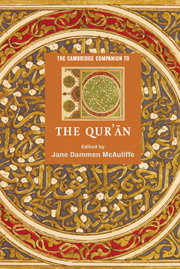Book contents
- Frontmatter
- Introduction
- Part I Formation of the Qur'ānic text
- Part II Description and analysis
- Part III Transmission and dissemination
- Part IV Interpretations and intellectual traditions
- Part V Contemporary readings
- 12 Women’s readings of the Qur'ān
- 13 Political interpretation of the Qur'ān
- 14 The Qur'ān and other religions
- Qur'ān Citation Index
- General Index
14 - The Qur'ān and other religions
from Part V - Contemporary readings
Published online by Cambridge University Press: 28 March 2007
- Frontmatter
- Introduction
- Part I Formation of the Qur'ānic text
- Part II Description and analysis
- Part III Transmission and dissemination
- Part IV Interpretations and intellectual traditions
- Part V Contemporary readings
- 12 Women’s readings of the Qur'ān
- 13 Political interpretation of the Qur'ān
- 14 The Qur'ān and other religions
- Qur'ān Citation Index
- General Index
Summary
The role of religion in building bridges between communities is under greater scrutiny today than it was in the 1970s and 1980s. In the present period, religion has assumed a critical responsibility in defining the guidelines for life in a civil society in which a modern notion of inclusive citizenry is at odds with a community of the faithful defined as religiously exclusive. Monotheistic traditions like Judaism, Christianity and Islam are notoriously exclusivist in their theologies and discriminatory in their laws. In order to meet the challenge of all-encompassing secularisation, religious scholars are engaged in exploring the scriptural resources of their respective traditions to provide relevant textual references and their accompanying interpretations that can accommodate the demands of plurality in human religious commitments. This chapter undertakes to examine Islamic scriptural sources to demonstrate that the Qur'ān and its interpreters were fully aware of the need to provide principles that could guide co-existence among religious communities so that people could learn to live together in harmony and peace.
Taking pluralism to mean the acknowledgement and affirmation that various spiritual paths are capable of guiding and saving their adherents, the basic argument to be made about the relation between the Qur'ān and pluralism is that Muslim scriptures capture the real experience of the early community as it struggled to balance tolerance with exclusive truth claims that provided the nascent Muslim community with its unique identity among communities of the faithful.
- Type
- Chapter
- Information
- The Cambridge Companion to the Qur'ān , pp. 291 - 309Publisher: Cambridge University PressPrint publication year: 2006
- 7
- Cited by



